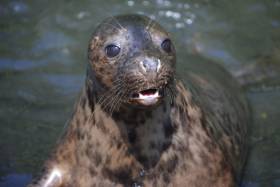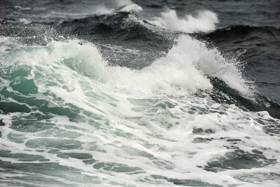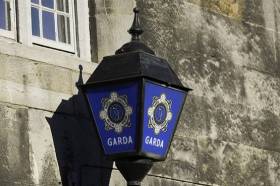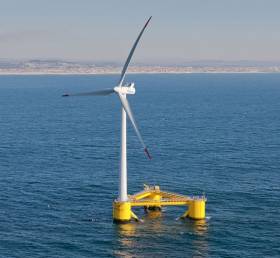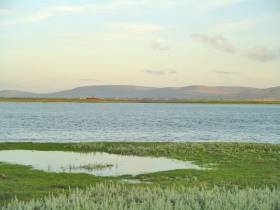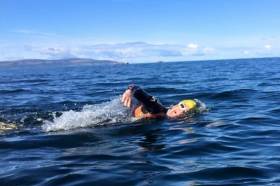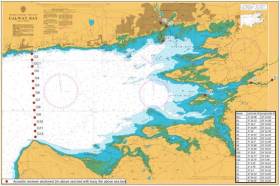Displaying items by tag: Galway Bay
'Poison Ivy' Returns To The Wild At Salthill Beach
#MarineWildlife - Months after she was found on the streets of Galway, the seal pup named Poison Ivy has returned to the sea at Galway Bay with a group of fellow rescued seals.
As previously reported on Afloat.ie, Ivy was no more than three weeks old when she was picked up by council workers on a Salthill footpath last December.
Though seriously ill, she fought her way back to health under the watchful eye of the staff at Seal Rescue Ireland in Wexford, who gave her a name in keeping with their comic-book theme.
But it was back to Salthill she went this past weekend when Ivy was released into the wild at Ladies Beach, according to Galway Bay FM.
#SeaPower - A public consultation is underway on the Marine Institute’s application for a foreshore lease to upgrade the Galway Bay Marine and Renewable Energy Test Site.
The Marine Institute has applied to the Department of the Environment, Community and Local Government for a foreshore lease for the site where prototype marine renewable energy technology can be tested at reduced scale to determine viability in an ocean environment.
Observations are invited on the foreshore lease application, which outlines plans to upgrade the current infrastructure and facilitate the deployment of a wider range of marine renewable energy devices and novel sensor technologies at the test site.
The Galway Bay Marine and Renewable Energy Test Site has been in operation since 2006 when it was established by the Marine Institute and the Sustainable Energy Authority of Ireland. The purpose of the site is to allow marine technology innovators to test the viability of small scale prototypes in an ocean environment.
A copy of the application and relevant maps, plans, reports and drawings are available to download HERE from the Department of the Environment, Community and Local Government’s website.
Copies of these documents are also available for viewing at Salthill Garda Station, Spiddal Public Library and Comhlacht Forbartha An Spideal Teo until 5pm on Friday 17 June.
Should you wish to make a submission on the lease applications you should do so in writing, giving reasons, within 21 working days of publication of this Notice (Friday 20 May), quoting ref FS 006566, to the Foreshore Unit, Department of the Environment, Community and Local Government, Newtown Road, Wexford or [email protected]. The closing date for submissions is close of business on Friday 17 June.
The Marine Institute plans to hold a public information evening in early June as part of the consultation process, details of which will be announced in due course.
For further information please contact Alan Berry at [email protected]
Boat Explosion In Galway Bay Sends One To Hospital With Burns
#Explosion - Galway Bay FM reports that a man was hospitalised after an explosion on a boat near Oranmore yesterday afternoon (Saturday 9 April).
Gardaí stated that a gas build-up in the vessel's engine caused the accidental explosion as it was being sailed in Galway Bay near Renvile.
One of the two was safe recovered to the shore while the other was taken to hospital with burn injuries that are not thought to be life-threatening.
#PowerFromTheSea - The Irish Times reports that the Marine Institute hopes to install wind turbines in Galway Bay for an offshore renewable energy trial.
Permission is being sought for up to three turbines, with a maximum height of 35m above sea level, that would be installed at different times at the current ocean energy test site off Spiddal, along with a prototype offshore power generating station that would cover an area of 37 hectares.
The entire project will open for public consultation on Monday 18 April. The Irish Times has more on the story HERE.
This story was updated to correct the previously reported 60m height of the turbines, which, according to the Marine Institute, was based on a error in the lease application form. The Marine Institute also clarified that the turbines would not be installed concurrently.
Low Waters Key In Search For Missing Man In Galway
#Search - The search remains ongoing for a man seen entering the water at Galway's Wolfe Tone Bridge 10 days ago.
As previously reported on Afloat.ie, the man in his 30s prompted a widespread search in the city's waters after going missing on the night of Thursday 10 March.
Today (Sunday 20 March) was expected to be significant in the search due to particularly low water levels in the docks and surrounds, according to Galway Bay FM.
And an appeal has gone out for volunteers to assist the new Oranmore-Maree Coastal Search Unit from the shore around Galway Bay from Salthill to Tawin Island.
In other news, the body of a woman was recovered from a car that entered the water in Howth Harbour on Friday morning (18 March). TheJournal.ie has more on the story HERE.
Galway Bay Swim Subject Of New Documentary
#GalwayBaySwim - A documentary celebrating 10 years of the Galway Bay Swim had a special screening in the City of the Tribes this week to mark the launch of the 11th charity swim this July.
As Galway Bay FM reports, the documentary was directed by local filmmaker Pat Comer and pays tribute to the hundreds of swimmers who've taken to the water at Auginish and crossed the bay to Blackrock Diving Tower in Salthill since 2006 in honour of the late Frances Thornton and to raise finds for cancer support.
"The documentary really captures the essence of the swim and everyone that takes part in a voluntary or swimming capacity," said David O'Donnell of Cancer Care West.
Registrations open this Sunday 20 March for the 11th swim, scheduled for Saturday 23 July. Galway Bay FM has more on the story HERE.
Galway Coast Gets New Volunteer Search Unit
#Galway - Galway Bay FM reports on a new volunteer search and rescue unit set up near the city weeks after community efforts to locate missing NUI Galway student Michael Bulger.
As previously reported on Afloat.ie, Bulger's body was recovered from the water near Oranmore on Galway Bay early last month after three weeks of searches largely driven by local volunteers.
Now the Oranmore-Maree Costal Search Unit, which will hold a public meeting on Monday week, hopes to harness those efforts across a 30km span of coastline split into nine zones with the co-operation of the Garda, Civil Defence and the RNLI.
Galway Bay FM has more on the story HERE.
Marine Notice: Deployment Of Fish Tag Detectors In Galway Bay
#MarineNotice - The latest Marine Notice from the Department of Transport, Tourism and Sport (DTTAS) advises that Inland Fisheries Ireland (IFI) and SmartBay Ireland will be carrying out the deployment of an underwater array of fish tag detectors in Galway Bay as outlined in Foreshore Licence FS6536.
The deployment operations for the array will take place between Spiddal and Blackhead and in the Corrib and Dunkellin estuaries, which are part of Galway Bay.
The acoustic array consists of 19 individual receivers as detailed in Marine Notice No 8 of 2016, a PDF of which is available to read or download HERE.
Deployment operations will be carried out by MV Tarrea Queen (Callsign EIAC3) and will take place from 3-17 March 2016. Subject to weather conditions, the operations may extend an additional two weeks following this planned period.
Each mooring/receiver will be marked with a subsurface buoy at a depth of >8m to avoid any potential fouling with any craft. All moorings and associated infrastructure will be removed following the completion of the study.
Consultation with fishermen was carried out during the Foreshore Licence process to ensure that equipment was not deployed in areas utilised by commercial fishermen.
All units will be clearly marked with IFI logos and numbered so that any unintentional retrieval can be notified to IFI through the contact details provided in the Marine Notice.
Coastal Communities Integral To Any 'Blue Growth' Strategy Says UN Expert
#CoastalNotes - The rights of coastal communities involved in the likes of small-scale fishing and seaweed harvesting must be respected in any 'Blue Growth' strategy, a UN expert has said.
The Irish Times reports on comments made by UN fisheries chief Dr Rebecca Metzner upon her visit to Galway this week, where she heard the concerns of inshore fishermen who have protested against large-scale fish farming.
Local campaigners breathed relief in December when Bord Iascaigh Mhara (BIM) withdrew its application for what would have been the largest organic salmon farm in Europe, based off the Aran Islands in Galway Bay.
While recognising that aquaculture is required to "fill the gap" in the growing global demand for seafood, Dr Metzner emphasised that dialogue over shared access between local communities and larger commercial interests should be fundamental to any such plans.
She also heard from Connemara seaweed harvesters, who fear the loss of access to the coastline over legislation that may allow harvesting rights to be snapped up by much bigger State-owned enterprises – a situation the Government promised to review two years ago.
The Irish Times has more on the story HERE.
Galway Councillors Seek Solution To Inis Mór Ferry Woes
#FerryNews - Inis Mór residents are being left "in limbo" over the imminent loss of the island's ferry service due to a passenger levy dispute.
Sunday 31 January will be the last day of ferry sailings in Galway Bay between the largest of the Aran Islands and the mainland – and Galway councillors have directed their ire at Gaeltacht Minister Joe McHugh for the transport crisis.
As Galway Bay FM reports, Inis Mór is the only one of the Aran Islands that does not have a Public Service Obligation contract in place or its ferry service.
Islanders have been hit by sharp fare increases for a number of years after the ceasing of the State-subsidised contract for ferry services on a route that has seen an overall drop in passenger numbers by one-fifth in just six years.
Galway Bay FM has more on the story HERE.



























